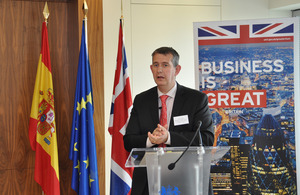UK and Spain making their health systems more efficient
The conference “Making National Health Systems Sustainable” took place on Friday 7 June at the British Embassy Madrid.

As a result of the long financial crisis the Spanish and British health systems face important challenges, such as ensuring that each euro invested delivers the very best results. Several leading figures from the sector took part, including the Head of European and Global Affairs at the UK’s Department of Health, Nick Thomlinson, Scottish NHS 24 Chief Executive, John Turner, Health Advisor for the Community of Madrid, Javier Fernández-Lasquetty, and Northern Ireland Minister for Health, Social Care and Public Safety, Edwin Poots. The aim of the conference was to share experiences and inspire new ideas on how to reduce costs without impacting levels of patient care.
Interview to Edwin Poots:
Nick Thomlinson referred to this last point, stating that these days it was not easy to sustain the health needs of citizens. The population was ageing and required increasingly complex treatments, which represented a common challenge for both the UK and Spain. Thomlinson also said that both health systems were amongst the best in the world: to put that into figures, he stated that the British system provided care to no less than 3 million people a week. However, it needed a change.
Thomlinson posed the question: “Why would we want to change the way it works if it is considered one of the best?”, and he answered by saying: “These days we have to make more efficient use of resources.” That was the reason that there had been adjustments in investment and why it had been guaranteed that most of the National Health Service resources would be invested locally.
Thomlinson also mentioned telecare as a good way to save money and at the same time improve patients’ health care. He concluded:
Our project 3 Million Lives aims to improve the quality of life of 3 million people in five years through the use of telecare.
Fernández-Lasquetty agreed that UK and Spain public health systems were excellent. However, he said, in Spain’s case it cost “a lot of money” to maintain it.
The sustainability of our system requires a large amount of money that comes entirely from the taxpayers’ pocket. The problem,” he said, “is that these pockets are increasingly emptier due to the financial crisis.
The Health Adviser for the Community of Madrid stated that a system whose only source of financing was taxes depended on the evolution of the economy, and this made it very vulnerable. In his opinion, the recent changes and privatizations proposed for the Spanish healthcare system were facilitating not only large cost savings, but also the achievement of that much sought-after structural sustainability.
John Turner highlighted two key dates for the Scottish health system. Firstly 2015, the deadline set for improving the care conditions of 10,000 patients and designing improvements and technological advances in the treatment of 55,000 more - all part of the framework of the Living It Up plan. Secondly, 2020, the deadline to carry out a reform of the public health sector, decentralize powers and move forward in research and development through increased investment in the sector.
The Northern Ireland representative, Edwin Poots, highlighted a key difference between his country and those mentioned previously: the youth of its inhabitants (it being the youngest population in the UK), that nevertheless would undergo an important change. According to Poots, in the next 15 years, the population over 65 would double. That obviously implied an increase in the number of diseases and pathologies. And whilst the annual expenditure on healthcare for that population segment was around €6,000 per head, he said that “changes are necessary”. That was why Northern Ireland had introduced so called multi-sector collaborative networks, which made the most of the services of its professionals, provided patients with care closer to their home, and reduced the number of unnecessary visits to hospital. Furthermore, Poots said that
the increasing use of telecaring in Ireland has lead to a more efficient service and early intervention with patients that have needed it.
Representatives from Castilla-La Mancha, Andalucía, País Vasco, Galicia, and the Spanish Ministry of Health, Social Services and Equality also took part in the event.
Updates to this page
Last updated 20 June 2013 + show all updates
-
Added translation
-
Added translation